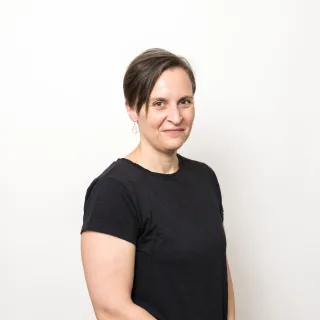Highlights from the Compass Annual Meeting 2018
Minnesota Compass celebrated its 10th anniversary on February 27th, when about 200 people joined us for our annual meeting. Wilder Research staff and guest speakers presented on quality of life trends in our communities. Paul Mattessich, Wilder Research executive director and Minnesota Compass governance committee chair, kicked off the event by welcoming attendees and thanking our collaborative of funders for their ongoing support and guidance over the past 10 years. MayKao Hang, President and CEO of the Amherst H. Wilder Foundation, spoke of the ongoing value of a resource like Minnesota Compass to our state's communities and diverse populations.
A video celebrating 10 years of Minnesota Compass
We unveiled a short video that illustrates the unique contributions of Minnesota Compass over the last 10 years. The video features interviews with three Minnesota Compass stakeholders who serve on our governance and steering committees: Susan Brower, Minnesota State Demographer, Minnesota State Demographic Center; Don Hickman, Vice President for Community and Workforce Development, Initiative Foundation; and Nadege Souvenir, Associate Vice President of Community Impact, The Saint Paul & Minnesota Community Foundations.
Want to take a longer walk down memory lane? Have a peek at this video created in the early years of Compass.
Recap of the presentations
The annual meeting was packed with presentations from Wilder Research staff and notable guest presenters. See below for a few highlights from the presenters, or see the full slide deck from the presentations here.
Minnesota Compass annual meeting 2018 presentation
10 Years of Compass: What's Changed and Important Trends to Watch Now
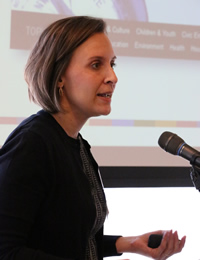
Allison Liuzzi, Compass Project Director, highlighted how trends have changed in the decade since Minnesota Compass launched. We've seen strong improvements in Minnesotans' quality of life over the last decade, but Allison cautioned that these improvements have not necessarily been experienced by everyone. Looking ahead, Allison gave a sneak preview of several new features and enhancements you can expect on Minnesota Compass in the coming year, including more and better data for greater Minnesota and disaggregated data on 14 of Minnesota's cultural communities.
What You Need to Know to Ensure a Fully Inclusive and Accurate Count in the 2020 Census
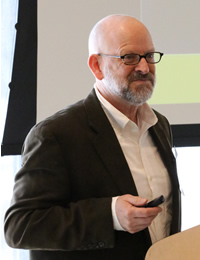
Bob Tracy, Director of Public Policy and Communications at the Minnesota Council on Foundations, explained how he has worked to get Minnesota ready for the 2020 Census. He emphasized the importance of an inclusive and accurate Census for political representation and reapportionment, allocation of public resources, making small "d" democracy work – here making specific mention of Compass as part of the fabric of small "d" democracy, and making smart business decisions and investments. Bob encouraged folks to join the Minnesota Census Mobilization Partnership as a way to help Minnesota achieve the goal of a fully inclusive, honest, and accurate 2020 Census.
Data Disaggregation: What It Means and Why We Need It
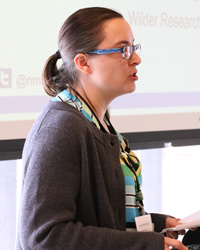
Nicole MartinRogers, Senior Research Manager at Wilder Research, described the importance of disaggregating race data to provide relevant information for policymaking and program development. She explained that "disaggregation" means splitting larger categories into more specific groups, in ways that help us better understand or unpack outcomes or other social issues. For example, we can disaggregate broad race categories into more specific ethnic groups – like Asian American into Hmong, Vietnamese, Lao, etc. – or by detailed demographic characteristics like age groups, disability status, and primary language. Nicole offered considerations for and challenges with disaggregating data, and concluded that careful, thoughtful data disaggregation can provide meaningful guidance for program and policy decisions.
The Importance of Data in Understanding and Supporting Minnesota's Cultural Communities
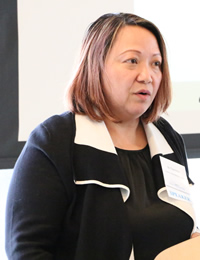
Bo Thao-Urabe, Executive and Network Director of the Coalition of Asian-American Leaders, illustrated the importance of disaggregated data. In her work with CAAL, Bo has seen how disaggregated data can help people see new, understand better, and do differently. Bo emphasized that systemic data disaggregation helps emphasize and build upon community assets, and allows communities to be smarter about addressing their specific needs. This allows communities to better inform policy that works toward equity goals.
The Continuing Value of Minnesota Compass: Reliable and Credible Data and Analysis Needed to Guide our Work and Ensure All Minnesotans Thrive
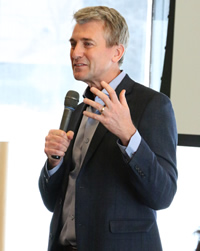
R.T. Rybak, President of The Minneapolis Foundation and former Mayor of Minneapolis, pushed the audience to focus on and better harvest strengths in communities. An assets lens allows us to see how emerging immigrant communities and multi-lingual residents – for example – can be strengths as we increasingly participate in a global economy and as we stare down a looming workforce shortage. He encouraged us to be ready to act by zooming in on a few data points that require collective attention and action. In his remarks, R.T. praised the achievements of Compass, describing it as a "backbone for addressing disparities" and a necessary tool for building a strong workforce and strong communities.
